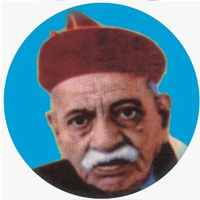Madhav Shrihari Aney
Dr. Madhav Shrihari Aney; popularly referred to as Loknayak Bapuji Aney or Bapuji Aney, was an ardent educationist, freedom fighter, statesman, a modern Sanskrit poet and a politician. He was also conferred with the title of “Loknayak Bapuji”, which means “The People’s Leader and Respected Father”.
Dr. Madhav Shrihari Aney (29 August 1880 – 26 January 1968);[1] popularly referred to as Loknayak Bapuji Aney or Bapuji Aney, was an ardent educationist, freedom fighter, statesman, a modern Sanskrit poet and a politician. He was also conferred with the title of “Loknayak Bapuji”, which means “The People’s Leader and Respected Father”.[2] He was one of the founder of the Congress Nationalist Party. He was first among the eminent disciples of Lokmanya Tilak such as N C Kelkar, Kakasaheb Khadilkar, Gangadhar Deshpande, Dr B S Munje, Abhyankar, T B Paranjpe and Vaman Malhar Joshi, who walked in the footsteps of Tilak.[3] Accepting the leadership of Mahatma Gandhi on the death of Bal Gangadhar Tilak. Aney persuaded his colleagues to see the writing on the wall. At the same time he was not blind in his loyalty. He disapproved Congress throwing itself in Khilafat Movement and warned against the forces that hamper the national interests. He regarded unity at any price as elusive and dangerous. Since the best safeguard for the minority was the goodwill of the majority. He never permitted his critical faculties to be blurred by emotion. Mahatma Gandhi admiring his calm logic, confided in him and often sought his counsel. He was chosen to arbitrate the disputes between Subhash Chandra Bose and Jatindra Mohan Sengupta. He was never a breaker or a destroyer but was always a cementing factor believing in synthesis and not in segregation
Bapuji Aney was born on 20 August 1880 in a family of Sanskrit pandits at Wani in Yavatmal district of Vidarbha in Maharashtra. His father Shrihari Aney was a learned pandit. It is said that his ancestors hailed from Telugu-speaking area with the surname “Annamraju” which was later transmuted into “Aney”. The other suggested origin name is Annamwar, also originating in Telangana. He was initiated into vedic studies early in life and soon ripened into profound Sanskrit scholar. He completed his B.A. from Morris College in Nagpur in 1902 and was a teacher in Kashibai Private School, Amravati in 1907. After taking his law degree from Calcutta University in 1907, he joined the bar in 1910 at Yavatmal, where he a built a lucrative practice. He used to attend courts for two weeks in a month and devout rest of the time to public work.[7] He wrote for the paper ‘Harikishor’1910 and was prosecuted for writing against the British government and was punished with cancelation of his Sanad to practice law for 1 year. In 1911 he accompanied Bal Gangadhar Tilak when the latter campaigned in Vidarbha. Tilak was Aney’s political guru, and Aney’s politics was an application of Tilak’s ideology.
In 1923, he was nominated to the Central Legislative Assembly as the representative of Berar Division. During 1941–1943, he was a member of the Viceroy’s Executive Council responsible for Indians Overseas and Commonwealth Relations. He resigned in 1943, when the British Indian government refused to release Mahatma Gandhi, while he was on fast. He was the High Commissioner to Ceylon from 1943 to July 1947. He joined the Constituent Assembly in 1947.
After Indian independence, Dr. Aney was the Governor of Bihar from 12 January 1948 to 14 June 1952.[10] He was also a member of the 3rd Lok Sabha from 1962 to 1967, representing Nagpur constituency.Mahatma Gandhi admiring his calm logic, confined in him and often sought his counsel.
He was chosen to arbitrate the disputes between Subhash Chandra Bose and Jatindra Mohan Sengupta.
He was never a breaker or a destroyer but was always a cementing factor believing in synthesis and not in segregation.

Madhav Shrihari Aney
Date of Birth: 29 Aug 1880
Birth Place: Wani
Proffession: Statesman
Nationality: Indian
Death: 26 January 1968


